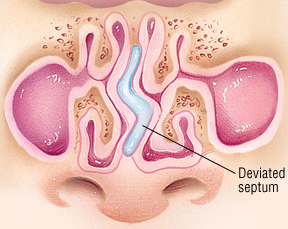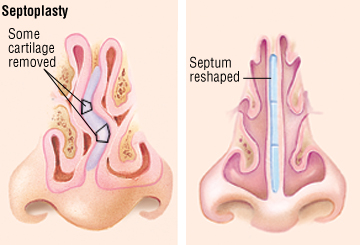Deviated Septum
Nasal septal deviation is a prevalent issue that may have dramatic quality-of-life ramifications. Septoplasty is a commonly performed procedure that provides various benefits to those with nasal obstruction owing to septal deviation.
Undisputed leader in deviated septum repair in New Jersey and NYC, Dr. Monica Tadros, clearly realizes that comfortable nasal breathing is directly linked to the quality of life. That's why she offers the most advanced and effective treatment solutions for patients suffering from this condition.
What Is a Deviated Septum?
A deviated septum implies that the septal cartilage component, septal bone component, or both are crooked. When this occurs, the nasal airway is narrowed and can be one reason why breathing is impacted.
The origin of a deviated septum ultimately centers on any insult that may have caused the septal cartilage or bone to grow off course.
Some of the major causes of this health condition are:
- A congenitally inherited predisposition
- Uterine development
- Trauma during childbirth
- Early nasal trauma that leads to a shift of the bony growth plate
Many times fractures of the septum are overlooked after nasal trauma in children and teens if a CT scan or endoscopic evaluation is not performed because the septum is a deep structure that cannot be well visualized externally. Over time the shape of the deviated septum may worsen the nasal airway and sinuses for many individuals. It can consequently lead to chronic mouth breathing and affect nasal development.
As a world-class facial plastic surgeon, Dr. Tadros performs deviated septum surgery in NJ and NYC with the highest caliber of quality. Thousands of grateful patients have earned Dr. Tadros one of the most respected reputations not only in the U.S. but across the whole world.
Dr. Tadros accepts most POS and PPO insurances for any medical issues related to the nose as an out-of-network provider. Please contact us today or call NYC: (201) 408-5430 or NJ: (201) 408-5430.
Common Symptoms of a Deviated Septum
The majority of septal deformities do not result in any symptoms. Some people may not even know they have a deviated septum. However, severe septal deformities may cause several issues.
The most common signs of a deviated septum are:
- Blocked nostril(s). Obstruction will make it difficult for you to breathe through the nostril or nostrils.
- Frequent nosebleeds. The risk of nosebleeds increases when the surface of your nasal septum becomes dry.
- Facial pain. It is believed that severe cases of a deviated septum can cause one-sided facial pain. It occurs when surfaces within the nose touch and cause pressure.
- Snoring during sleep. Noisy breathing during sleep may be caused by swelling of the intranasal tissues.
- Awareness of the nasal cycle. The nasal cycle is when nasal airflow is greater in one nostril than in the other. The greater airflow nostril shifts between left and right over time. The nasal cycle is normal, but being aware of it can indicate a nasal obstruction.
- Sleeping on a particular side. If one nasal passage is narrowed, some people prefer to sleep on a particular side to optimize breathing through the nose.
Treatment Options
Medications may help you reduce swelling or nasal dilators and will open the nasal passages. Surgery is usually the only option to correct functional abnormalities and nasal shape.
Septoplasty
Septoplasty is a nasal operation typically done through the patient’s nostrils without any external incisions. It is aimed to improve breathing and correct a deviated septum.
A basic septoplasty, also known as septal reconstruction, corrects the deviated portions of cartilage and bone and realigns these structures in the anatomic midline with no external change in the shape of the nose.
When indicated, a nasal septal deviation, performed in Dr. Tadros’ center for facial plastic surgery, may be combined with Turbinate Reduction and/or Balloon Sinuplasty or Endoscopic Sinus Surgery. This can be done to fully restore the sinus-nasal airway.
If the nose is also very crooked externally, a nasal fracture may have been overlooked, and a “Septo-Rhinoplasty” may be indicated to fully correct the condition.
How Should I Prepare for Surgery?
Your plastic surgeon Dr. Monica Tadros, M.D., may ask you to stop taking certain medications two weeks before surgery. These medications may include aspirin (Bufferin), ibuprofen (Advil), and other blood thinners. This is done to reduce your risk of excessive bleeding during and after the procedure. Be sure to tell your ENT specialist if you’re allergic to certain medications or if you have a history of bleeding problems.
Dr. Tadros will also ask you to stop smoking two weeks before your septoplasty. She will explain the whole procedure before surgery and will answer any questions you may have. You should understand all the risks and benefits before your surgery date.
In some cases, people have a septoplasty under local anesthesia, which numbs the area to prevent pain. However, most people have surgery under general anesthesia, which means they’re asleep during the procedure. Don’t eat or drink anything after midnight the night before the procedure if you’re going to be under general anesthesia.
Bring a family member or friend who can drive you home after the septoplasty. General anesthesia may make you drowsy after the procedure. You shouldn’t drive until the effects have fully worn off.
Your doctor might take pictures of your nose before septoplasty surgery in New Jersey and New York City. Comparing photos from before and after the procedure can help you see how your nose has changed.
What Are the Risks of Septoplasty Surgery?
You should keep in mind that any type of surgical intervention carries a risk of excessive bleeding and infection and septoplasty surgery is not an exclusion. But patients’ health and safety have always been top priorities for Dr. Monica Tadros. Therefore, you can be assured that your surgery will be performed under the most stringent safety protocols.
Some of the most common but rare risks associated with a deviated septum correction procedure are:
- Scarring
- Bleeding
- Altered shape of the nose
- Discoloration of the nose
- Decreased sense of smell
How Long Does It Take To Recover From Septoplasty Surgery?
Generally, septoplasty recovery time varies between one to two months depending on the complexity of the procedure. However, you should be able to return to work and resume your regular activities in about three weeks after surgery.
Due to the fact that the procedure is done on an outpatient basis, you will be able to go home on the same day as surgery. Your nose will be packed with cotton to control bleeding. You can remove the packing a day or two after surgery.
Are There Any Deviated Septum Surgery Recovery Tips?
Once the procedure is performed, your doctor will ask you to avoid medications that thin the blood. This will help you lower the risk of bleeding issues after the procedure.
As part of your recovery, it is recommended to limit physical activity for several weeks to avoid swelling and promote healing. Therefore, running, lifting heavy weights, and playing contact sports should be avoided. All the aforementioned activities can increase blood pressure and cause heavy bleeding.
Other tips that can boost your recovery are:
- Avoid blowing your nose for three days after the procedure
- Elevate your head at night to limit swelling
- Wear shirts that do not make you pull clothing over your head
How Long Does Septoplasty Take?
Depending on the severity of the condition, the procedure can take anywhere from 30 to 90 minutes. During surgery, you will be under local or general anesthesia. Once the anesthesia has worn off, you will be able to leave the clinic.
Is Deviated Septum Treatment Without Surgery Possible?
If you have a deviated nasal septum, surgery gives the most lasting and effective solution. However, many people try other treatments and get sufficient relief without surgery.
As part of a non-surgical deviated septum treatment, you can use nasal steroids or allergy medications. Be mindful that it’s not safe to take any medication without a doctor’s prescription.
If you decide not to opt for medications, you may try some of the deviated septum home remedies:
- Nasal strips. They contain spring-like bands that help open your nasal passages
- Nasal irrigation. Rinsing with salt water will help alleviate congestion
- A Vaporizer or Humidifier. They add moisture to the air, which helps relieve nasal congestion
- A Hot shower. A hot shower produces steam that has a similar effect to a vaporizer or humidifier
Is the Correction Procedure Painful?
Local anesthesia is used to prevent any discomfort or pain during the procedure. You should expect some swelling around the nose for two or three days following the procedure. To accelerate and improve healing, you should take a few days off. Treatment by professional septoplasty doctors normally brings little pain after surgery.
How Much Does a Deviated Septum Surgery Cost?
The cost of septoplasty in New Jersey and New York City depends on a variety of factors. According to several studies, the average cost of the procedure is between $3,500 to $5,500.
However, this amount does not include the cost of the operating room, anesthesia, and the medication required once the procedure is complete.
Does Insurance Cover Septoplasty?
Most medical insurance providers cover this procedure when performed for purely medical reasons. This procedure is deemed a medical necessity and, hence, often covered by insurance plans.
To determine whether you qualify for deviated septum repair with insurance, it is recommended to contact your insurance carrier.
Consultation
To schedule your no-obligation deviated septum surgery consultation with Dr. Monica Tadros, please use the contact form to request additional information or call NYC: (201) 408-5430 or NJ: (201) 408-5430 to speak to one of our Patient Advisors. Our offices are conveniently located near 300 Grand Ave, Englewood, NJ 07631 and 911 Park Ave., New York, NY 10075.


